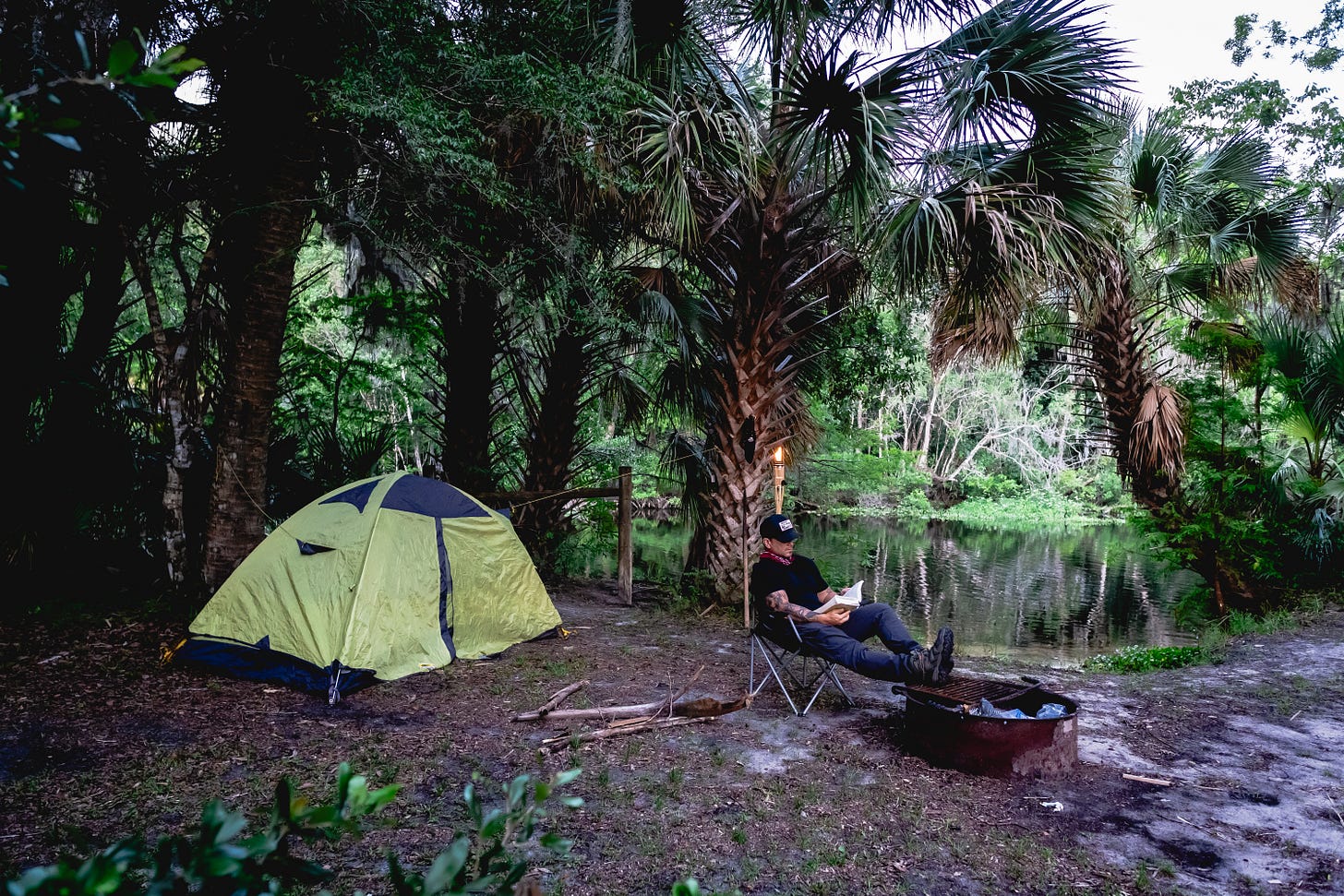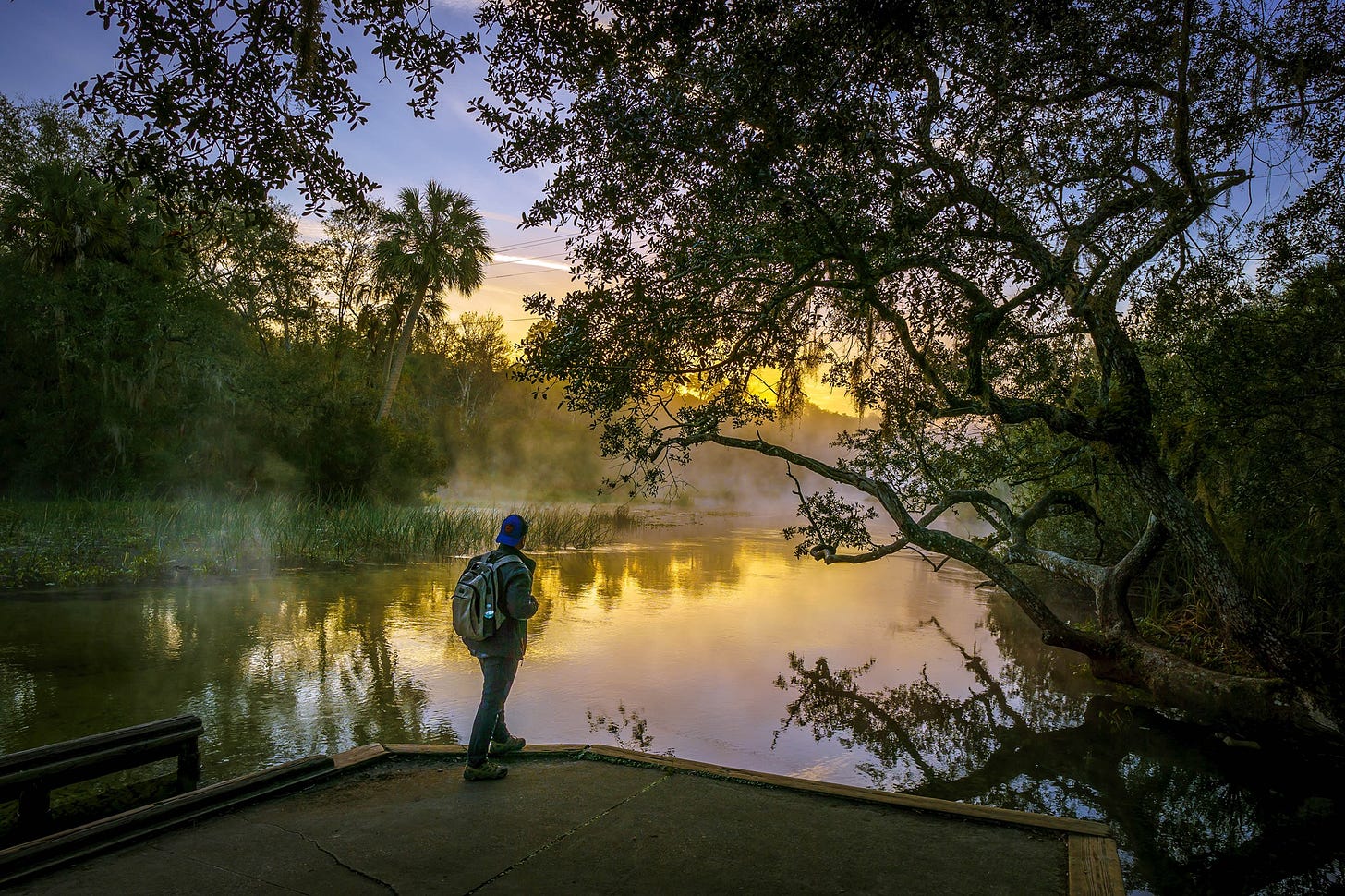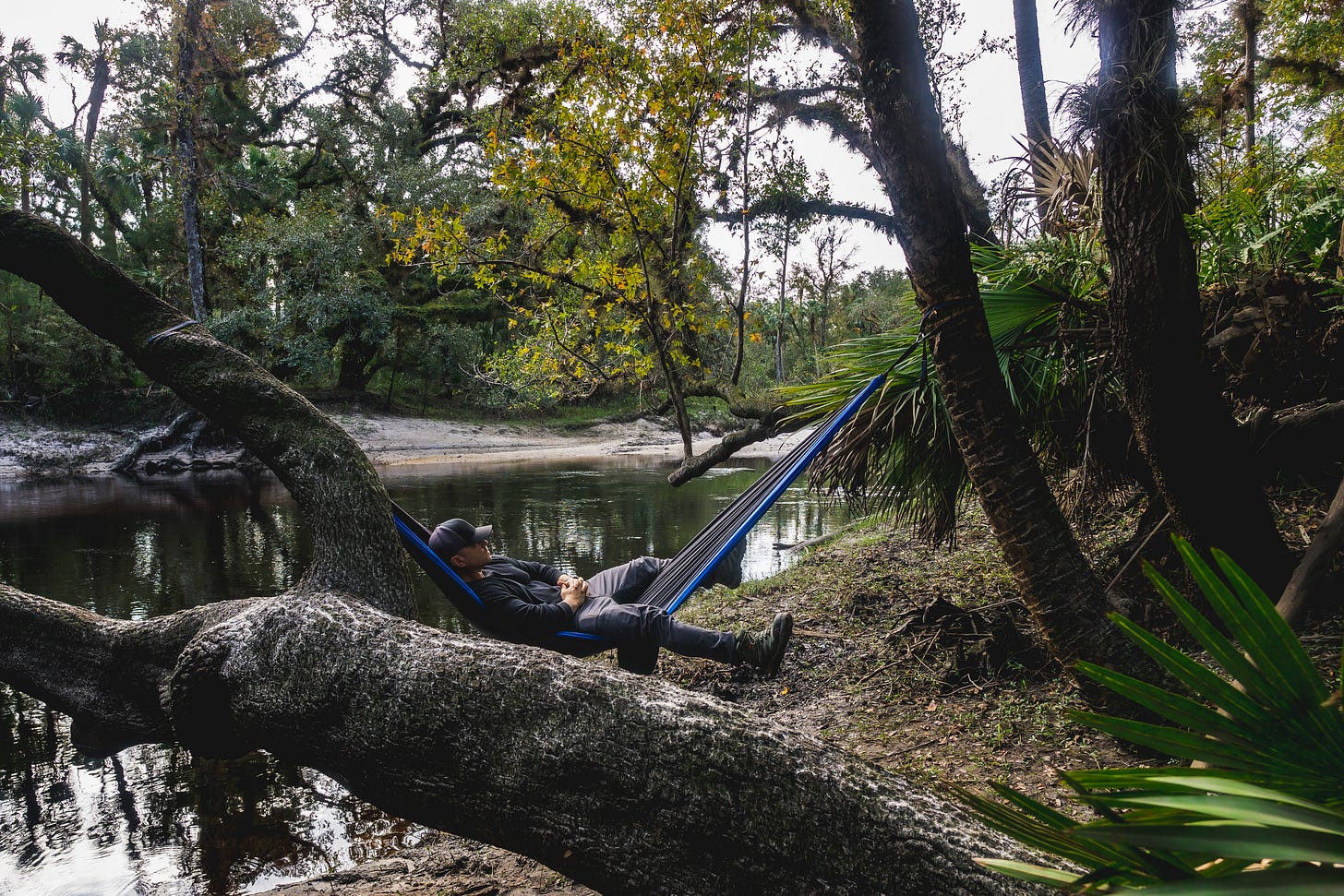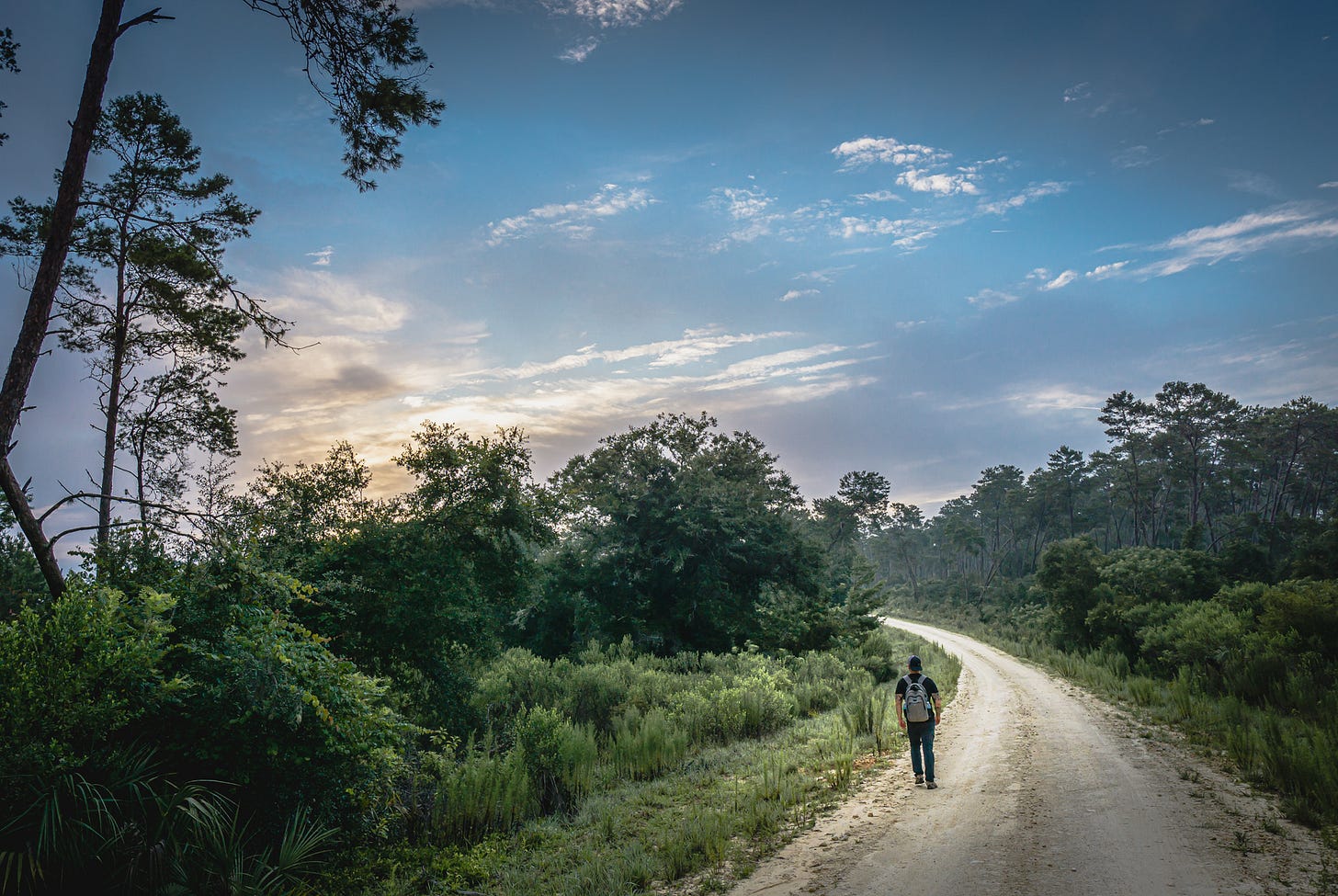"The world that used to nurse us now keeps shouting inane instructions. That's why I ran to the woods."
~ Jim Harrison
It’s 7 am.
After a two-hour drive, I arrive at the edge of a lush forest. I park my car, finish my coffee, stretch my legs, shoulder my pack, and set out on the trail. Alone, as usual.
“The woods are lovely, dark and deep. But I have promises to keep, and miles to go before I sleep.”
I walk the dirt path lined with ferns wet with morning dew. The singing birds and an earthy aroma lift my spirit. The golden rays sprinkle through the century-old trees, and yesterday’s burdens become lighter. I have about 8 miles to get to a little campsite on the river. Onward, I push.
Come, take a metaphysical journey with me.
Solitude in nature is my little buffer to the hopeless hustle of the modern world. It’s nothing radical or profound, I know, but it enlivens the senses. Like Thoreau, I love the primordial paradise of the woods because they serve as a refuge for our existential anguish, a sanctuary of stillness for our busy lives.
As the great naturalist John Muir once wrote: “Only by going alone in silence, without baggage, can one truly get into the heart of the wilderness. All other travel is mere dust and hotels and baggage and chatter.”
It’s vital for the soul to occasionally break from our monotonous routines. To untangle ourselves from the web of domestication and follow that age-old call of the wild.
It’s good to depart from the ranks and embark on a solitary adventure. To get a little uncomfortable and exhausted while sauntering in the unknown. To walk in the rain, chop wood, follow a map, get bit by bugs, stare at a tree, find a good place for shelter, breathe in the forest, and revive that inner archaic spirit that resides in all of us.
We moderns have lost the soul-nourishing art of solitude and silence. We have a feverish need for screens and constant stimulation and commotion to feed our sense of self-worth. Endless scrolling is our cure for boredom. Spiritually speaking, it’s not a healthy way to live. And we all know it. We’re deathly afraid of what we might find inside ourselves if we sit still long enough and listen.
As Nietzsche well understood, “Haste is universal because everyone is in flight from himself.”
According to the profound Swiss psychiatrist Carl Jung, we moderns have become “extraverted as hell” and show a “remarkable lack of introspection.” He saw all too clearly that the average person today was stressed the hell out and uneasy due to our ego-serving activities. We’re so damn focused on outer achievement that we neglect our inner landscape at a detrimental cost.
Jung believed that the development of human consciousness was a slow, laborious process “that took untold ages to reach the civilized state.” In order for the development of consciousness to occur, humans had to “separate from the instinctive base” of our nature.
However, Jung thought the separation had gone too far. As a result of the conscious mind’s complete disunion with the instincts, life has grown cramped and hollow, contributing to many of the modern ailments we see today — anxiety, depression, purposelessness, egomania, etc. “The loss of instinct is largely responsible for the pathological condition of our contemporary culture.”
In other words, our world has become dehumanized and disenchanted as a consequence of subduing our own wildness. “Too much of the animal distorts the civilized man, too much civilization makes sick animals.”
I march on. The soil is soft and sandy beneath my feet. I walk along beneath the ancient oaks that stand with dignity as the dripping moss sways in the morning breeze. So far, I haven’t seen another human out here. I’m alone, and an unimaginable peace sweeps over me. I recite the words of Wordsworth to myself as I float along:
I wandered lonely as a cloud That floats on high o'er vales and hills, When all at once I saw a crowd, A host, of golden daffodils; Beside the lake, beneath the trees, Fluttering and dancing in the breeze.
I often return to nature because the world is loud and restless. It’s filled with infinite distraction, which is mostly all drab and dreary nonsense. If you direct all your attention to what the suggestion-apparatus of our screen-oriented society wants you to pay attention to, you will rob your life of its essence.
Jim Harrison reminded us that “the wilderness does not make you forget your normal life so much as it removes the distractions for proper remembering.”
At times, you have to leave behind the defiled air of the cities, with its imprisoning walls and the repugnant jostle of crowds, and enter into the serene cathedral of the woodlands, where you can step out of the costume of the synthetic self and become inhuman, a sage, or a demented saunterer at one with everything.
The bloodless commotion of the civilized world fades, and the trees, rivers, and wildlife do not speak. There are no words out here, no gimmicks, no theories. Yet there’s wisdom in the silence — if you have the metaphysical ears to listen.
As Terence McKenna reminded us: "If you want a teacher, try a waterfall. Or a mushroom or a mountain wilderness or a storm-pounded seashore. That is where the action is."
Here, among lush greenery, all the senses are heightened. You can meditate on the secrets of the wind and gaze up at the nighttime stars with your mind unmolested by the stifling occupations of the modern world. The affairs beyond the forest are of no bother.
Like Whitman, I can sing the song of myself and dance bare-assed around the bonfires of life. I can sit in a meadow and think about absolutely nothing other than the cloud formations overhead. I can sleep on the earth and let its essence penetrate every cell of my being. It’s in solitude, alone in the natural world, when I feel most free, most alive.
I know it’s not for everyone, but for me, it’s where it’s at. It’s my little sacred place tucked away from the desecrated wastelands of modernity. A place to breathe, reset, and reacquaint myself with the essential. It was Mircea Eliade who once reminded us:
“The Experience of Sacred Space makes possible the founding of the world: where the sacred Manifests itself in space, the real unveils itself, the world comes into existence.”
One of the beautiful things about exploring the deep wilderness is that there are no inane rules or bureaucratic directives. You don’t need a passport, ask permission, or have a big bank account to enter the gates of this sublime garden.
In the words of Thoreau, “Give me a wildness whose glance no civilization can endure.”
Out here in nature, it’s nearly impossible to be swindled by second-hand reality. Everything you see is what is. The mask falls away, the ego subsides, and you finally recognize the mere futility of much of your worldly inhibitions. You welcome life wholeheartedly as it comes to you.
Though civilization is near, its tainted scent is far from my nostrils. At least for now.
The journey into the wilderness, into the mountains, forests, and deserts, only requires a will of the spirit. Very few possessions are needed. A rucksack, a sleeping bag, a tent, and a little nourishment—that’s it. You have the entire universe to yourself free of charge. As I always say, the less you need, the more you become.
It’s long been known since ancient days that nature cleanses the soul and feeds the imagination. It induces you to think, reflect, question, and reconnect to where you came from. Unlike the everyday world, everything in nature isn’t planned, regulated, and routine. We can no longer exist on autopilot as we do in our everyday lives. You have to be present in the moment and aware of your surroundings.
You have to be alive, intensely so.
As the naturalist Horace Kephart once said: “The man who goes afoot, prepared to camp anywhere and in any weather, is the most independent fellow on earth.”
I finally arrive at my campsite. The river is slow and peaceful, and the subtle wind feels good on my perspiring flesh. I set up my tent and cook supper over a fire. The fish splash and the leaves tremble, and I watch a kingfisher swoop down into the water as I take a pull of whiskey from a beat-up flask. Everything is harmonious and alive.
The sun finally vanishes and the dark sets in. Strangely, I feel utterly at home. The night cradles me, and the stars and moon feel like family. I lie motionless in my tent. The sounds of crickets, frogs, and a trickling stream serenade the dark as I finally nod off into my dreams.
Morning arrives. The long-lost sun spills its first rays of light into my tent. My body is sore and ragged from yesterday’s trek. What a glorious feeling it is to step out into the fresh dawn with mist and fog hovering above the still water. Smoke from the embers of last night’s fire still wafts in the air. There’s an osprey with its wings widespread sunning on the broken roots of a cypress. A vulture hovers high in the sky.
I brew my coffee over a flame and sit on a stump as a serene spectator of the natural order. Wildlife flourishes around me. I see a deer in the distance. The birds and the sound of the river caress my ears. Lao Tzu reminds us that “Nature does not hurry, yet everything is accomplished.”
Indeed.
The sky is radiant and the trees are silent. There’s a man fishing from a small skiff floating down the river. After a leisurely, do-nothing morning, I finally pack up my camp, shoulder my pack once again, and make my way back to the heartland of hustle.
Mr. Wendell Berry, guide me home.
When despair for the world grows in me and I wake in the night at the least sound in fear of what my life and my children’s lives may be, I go and lie down where the wood drake rests in his beauty on the water, and the great heron feeds. I come into the peace of wild things who do not tax their lives with forethought of grief. I come into the presence of still water. And I feel above me the day-blind stars waiting with their light. For a time I rest in the grace of the world, and am free.
Thank you so much for reading. My work and research I put into this Substack Page are entirely reader-supported. If you enjoy the content I provide and are not ready to become a paid subscriber, you can simply make a one-time donation here at Buy Me A Coffee. If you can. I appreciate you all following this page. You’ve truly made it into a magical little online community. Thank You.











This piece eloquently describes what I experience whenever I’m in the woods or on a solo canoe trip. Thanks to age and a severely compromised spine, these adventures have become increasingly difficult and will likely be impossible soon. The inability to be in nature as I have for 70+ years is what I dread most about lies ahead. I have a sense of impending, profound loss. To all of you, get off your asses and get in the wilderness as much as possible while you can.
A closing pivot, I can help but notice with amusement the irony of this piece having been created on an electronic device for all of us to consume and appreciate on our electronic devices 😉.
Thank you. A heartfelt joy. Reading this is a mental hike through deep woods.